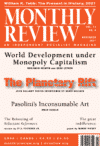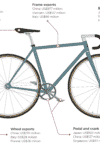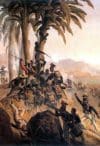
The Eyes of Texas and the Nays
A new poem by Marge Piercy. | more…

A new poem by Marge Piercy. | more…

There is an urgent need to transcend the deep chasm in historical materialism, extending back to the 1920s, between the Western Marxist philosophical tradition and the Marxism of the Second and Third Internationals. This division has been closely associated with so-called Western MarxismÕs rejection of the dialectics of nature. | more…

The widespread view on the left that Marx had adopted an extreme productivist view of the human domination of nature—and hence had failed to perceive the natural limits to production and ecological contradictions in general, giving them at most only marginal attention—was contradicted by his theory of the metabolic rift. | more…

As the internationalization of monopoly capital grows, particularly through the domination of global value chains, the worldwide rate of exploitation and degree of monopoly increase as well. | more…

The job of socialists is to engage with public policy from a class perspective, informed by a Marxist understanding of contemporary capitalism—not to reform it, but to abolish it. | more…

The reissuing of Reluctant Reformers can inform our attempts to grapple with how the unity of the oppressed can be forged in such a way that the interests of the historically marginalized do not continue to get…well, marginalized. | more…

A new poem by Marge Piercy. | more…

The current situation in Haiti has roots in the historical struggle of the Haitian people, and is part of the endless retribution from imperial powers for its revolution. | more…

In India, today, we are witness to the quiet rise of the figure of Mahar Sidnak, iconized and lionized as a warrior of the oppressed from the early nineteenth century. This is electrifying the anticaste struggle and energizing the militant youth, a source of inspiration as historical as it is mythical. Are material issues, or “real struggle,” really so opposed to the question of the “mythical past”? | more…

In 1970, the French left-wing filmmaker Chris Marker made a twenty-minute documentary about the French left-wing publisher François Maspero. Fleetingly, we catch a glimpse of two publications pinned side by side on one wall, seemingly granted special placement: a copy of The Black Panther newspaper and a Monthly Review. Hardly surprising is this prominence: Maspero’s relationship with Monthly Review was always fraternal, both interfaced with one another, shared lists. Together, they helped define what that New in the Left would mean. | more…

Forthcoming in June 2021
In March 2015, President Obama initiated sanctions against Venezuela, declaring a “national emergency with respect to the unusual and extraordinary threat to the national security and foreign policy of the United States posed by the situation in Venezuela.” Each year, the U.S. administration has repeated this claim. But, as Joe Emersberger and Justin Podur ague in their timely book, Extraordinary Threat, the opposite is true: It is the U.S. policy of regime change in Venezuela that constitutes an “extraordinary threat” to Venezuelans. Tens of thousands of Venezuelans continue to die because of these ever-tightening U.S. sanctions, denying people daily food, medicine, and fuel. On top of this, Venezuela has, since 2002, been subjected to repeated coup attempts by U.S.-backed forces. In Extraordinary Threat, Emersberger and Podur tell the story of six coup attempts against Venezuela. | more…

One of the key components of U.S.-China strategic competition is the technology war, the essence and implications of which can be further understood in the broader context of the international division of labor and the two countries’ internal contradictions. From this front, we can decipher the antagonism between different classes/groups within and across the two countries. | more…
Notifications